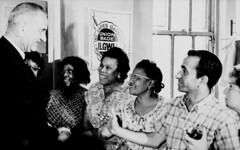Corporations Seeking "Job Creation" Tax Breaks Hide Outsourcing Stats with Government Help

Multi-national corporations are begging for U.S. tax breaks in the name of job creation, but refusing to reveal how many of those jobs are created overseas, Jia Lynn Yang reports for the Washington Post:
Some of the country’s best-known multinationals closely guard a number they don’t want anyone to know: the breakdown between their jobs here and abroad.
So secretive are these companies that they hand the figure over to government statisticians on the condition that officials will release only an aggregate number. The latest data show that multinationals cut 2.9 million jobs in the United States and added 2.4 million overseas between 2000 and 2009.
Some of the same companies that do not report their jobs breakdown, including Apple and Pfizer, are pushing lawmakers to cut their tax bills in the name of job creation in the United States.
But experts say that without details on which companies are contributing to job growth and which are not, policymakers risk flying blind as they try to jump-start the hiring of American workers.
All U.S. multinationals are required to report their overseas hiring data to the Commerce Department, but the government promises not to disclose these figures to the general public.
Asked by the Post why the government agrees to keep this information secret, a researcher at the U.S. Bureau of Economic Analysis gave the official equivalent of a shoulder shrug: “I don’t think it’s a question of companies feeling like they’re hiding dirty laundry by not giving this information out,” Ray Mataloni said. “I don’t think they really have anything to hide, but I don’t really know the logic of why that’s something they don’t just put in their annual report.”
Others see the government as complicit in concealing politically volatile facts about job creation, or lack thereof.
“Outsourcing has become a lightning rod, and the media coverage they’re likely to get is unfavorable,” Scott N. Paul, the executive director of the Alliance for American Manufacturing, told the Post.
The federal government is spending taxpayer dollars to keep track of outsourcing statistics from major multinational corporations and promising to keep that information secret, even though it bears on critical public policy decisions.
For example, Apple and Pfizer, two companies that stopped disclosing their overseas job numbers, are part of a corporate lobbying coalition clamoring for a massive temporary tax cut on profits earned overseas but repatriated to the United States. These gains would ordinarily be taxed at 35%, but if the lobbyists get their way, there would be a 1-year window to bring home the money at a tax rate of 5.25%.
Not to be outdone, Republican presidential hopeful Gov. Rick Perry suggested at a campaign event in New Hampshire last week that corporations should be allowed to bring home the fruits of offshoring at an even lower rate:
And here’s another issue from my perspective. Corporate profits that are offshore, that we tax at 35 percent. We know for a fact that money’s not coming back. They’re going to leave that offshore. So why not look at, and talk about, how you repatriate those dollars and have those dollars focused on job creation, but allow them to come back in at a substantially lower rate than 35 percent. Say, something like, if it’s clearly going for job creation, like zero, to get this economy working again.
The corporate lobbying coalition claims that what looks like a blatant giveaway to multinationals actually serves the greater good because the companies will use the money to create jobs. Of course, there’s no guarantee that companies will spend their tax windfall on hiring. In all likelihood, they won’t. Multinationals got a similar tax holiday in 2004, but subsequent analysis showed that very little of the money went to job creation, most of it went to pay higher returns to shareholders. Many firms that cashed in in 2004 went on to lay off thousands of workers. Pfizer, for example, repatriated $37 billion in 2004 and laid off 10,000 employees in 2005-2006.
If we can’t trust corporations to be honest about outsourcing statistics, we shouldn’t trust them with a massive tax giveaway predicated on their unverifiable promise to create jobs at home.
[Photo credit: Dan Brady, Creative Commons.]




 This week, the Hillman Foundation gave the
This week, the Hillman Foundation gave the 

